Incoming Postdocs
Postdoc Spotlight
Meet Dr. Pallavi Singh
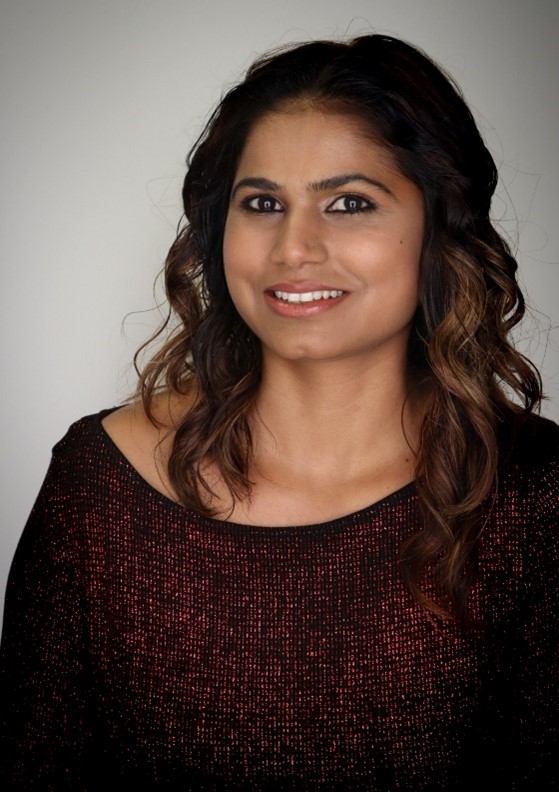
Hello! I'm Pallavi, a Ph.D. holder in Electrical Engineering with a strong passion for applying advanced technology to solve real-world problems. My skill set includes expertise in machine learning, data analysis, and visualization techniques. I have worked intensively with, data cleaning, statistical modeling, and the design and implementation of AI/ML models. I am always excited to work on new projects where I can apply these skills to drive impactful outcomes in technology and industry. I also served as the president of the International Society of Automation (ISA) organization at the University of South Florida (USF), where I facilitate partnerships between the university and industry, leading new innovations and research opportunities for students.
Learn more about Dr. Singh
Can you tell us about your area of expertise and the department you are contributing to at USF?
I am currently working as a Postdoctoral Researcher in the Department of Mechanical Engineering under Dr. Nancy Diaz Elsayed, focusing on the “Smart Manufacturing Industry Initiative (SMII).” My research expertise lies in artificial intelligence, Internet of Things (IoT), and data analytics, production process optimization, energy efficiency, and leverage real-time sensor data for monitoring & predicting product quality & production. I also apply advanced robotics and automation to streamline manufacturing production lines.
What inspired you to pursue this career path, and what keeps you passionate about it?
I have always been inspired by creating technological solutions to address existing process challenges. What keeps me passionate is witnessing the successful implementation of these solutions and the impact they create.
Looking back, what do you consider your biggest success or proudest moment in your research career so far?
Throughout my research career and PhD journey, there have been many proud moments. One that stands out is my persistence in overcoming numerous failures to achieve success.
How do you envision your research contributing to society or your field in the long term?
My research is driven by economic and workforce development goals. It focuses on training individuals in emerging technologies, which can lead to economic growth and improved industry practices.
What has been the most rewarding aspect of your postdoctoral experience at USF?
Collaborating with individuals from across the globe and professional backgrounds has been incredibly rewarding. I have gained a wealth of knowledge from these experiences, and together, we creatively tackle challenges.
What advice would you give to undergraduate or graduate students who aspire to follow a similar career path?
Don’t limit your thought process by believing that a specific specialization defines your career path. Any career is just a stepping stone for your next adventure. Follow your heart and pursue what truly excites you.
How do you maintain a healthy work-life balance while managing the demands of your postdoctoral research?
I prioritize taking time off on weekends, going on vacation trips with friends, and spending quality time with family and friends. Establishing a routine for self-care throughout the week also helps.
When you're not immersed in your research, how do you like to unwind?
I enjoy spending time with friends, playing Catan, going for walks, and volunteering with church administrative work.
What is your favorite place to hang out in the Tampa Bay area, and why is it special to you?
I don’t have a specific favorite place, but I love the Tampa Bay Trail, Bayshore Riverwalk, and Armature Works—any location with a scenic walking trail.
Are you seeking any collaborations or opportunities currently? If so, how can people reach you?
Yes, we are always open to collaborations in education and training, undergraduate research, and workforce development. Please feel free to reach out to me at pallavi2@usf.edu.
If your research could take you anywhere in the world, where would you love to go, and why?
If my research could take me anywhere in the world, I would love to visit Hawaii.
What's your favorite way to take a break and reset your mind during a busy research day?
My favorite way to reset during a busy research day is taking a long walk with a friend.
Do you have a hidden talent or a party trick that has nothing to do with your research? We'd love to see it!
I can beat anyone at Catan!
Meet Dr. Dai-Nam Le
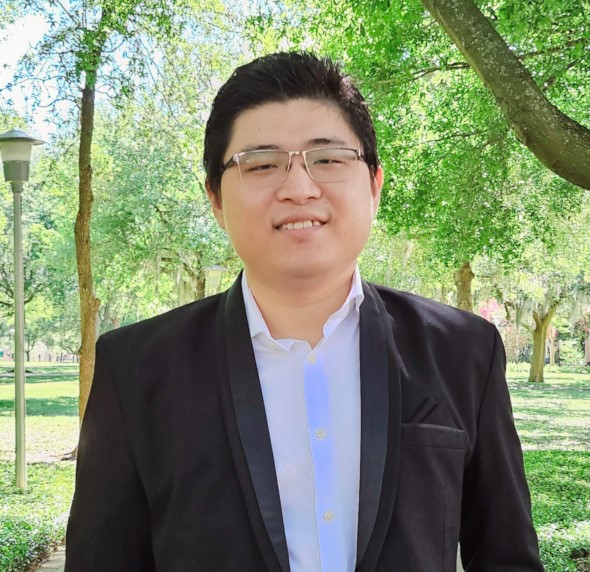
Dai-Nam Le obtained his bachelor's degree in Physics Teacher Education from Ho Chi Minh City University of Education, Vietnam - his home country - in 2015 and then followed by earning his Ph.D. degree in Theoretical and Mathematical Physics from Vietnam National University Ho Chi Minh City, Vietnam in 2023. During his studies, he has been recognized with several awards, including as a medal recipient in several physics and mathematics Olympiads in Vietnam. When pursuing his Ph.D., he worked at Ton Duc Thang University, Vietnam as a researcher for 6 years. He has published 33 peer-reviewed publications as well as 3 under-reviewed preprints in several prestigious journals such as Physical Review B, Journal of Physical Chemistry C, Communications Materials, Journal of Mathematical Physics, Journal of Cosmology and Astroparticle Physics, …. Besides, he also has served as a peer reviewer for several physics journals such as Phys. Rev. Lett., Phys. Rev. B (American Physical Society), J. Phys. A, J. Appl. Phys., ACS Photonics, etc. as well as funding review for Vietnam National Foundation for Science and Technology Development. He is a member of the American Physical Society, American Mathematical Society - Mathematical Reviews, and Vietnamese Theoretical Physics Society. He worked on mathematical physics problems related to supersymmetry quantum mechanics on Dirac materials, the nine-dimensional MICZ-Kepler problem, and two-dimensional atomic systems like exciton. He joined Dr. Lilia M. Woods’ research group in the Department of Physics, University of South Florida, Tampa, Florida as an academic visitor in 2021 and later on became a postdoctoral researcher in 2023. His current research interest is dissipative phenomena in novel materials such as Casimir or van der Waals interaction, near-field radiative heat transfer, and quantum friction. More information about his research can be found on his homepage.
Learn more about Dr. Le
Can you tell us about your area of expertise and the department you are contributing to at USF?
I am working in USF Department of Physics in the Advanced Materials and Devices Theory Group of Dr. Lilia Woods (Professor, Associate Chair). We are currently interested in dissipative phenomena in novel materials such as Casimir or van der Waals interaction, near-field radiative heat transfer, and quantum friction. Such kind of phenomena are caused by quantum vacuum fluctuation and affect the synthesis, efficiency, and reliability of nano or sub-nano devices. Please visit Dr. Woods ‘s homepage to find out more about our team and our research: https://www.amd-woods-group.com/.
What inspired you to pursue this career path, and what keeps you passionate about it?
When entering college, I was more interested in being a physics teacher in high school and never thought about doing science. During that time, I joined a research group in my university in other to spend time doing something else instead of boring homework in classes. Then I realized that nothing can compare with the happiness from doing research and I decided to pursue my Ph.D. degree to become a professional scientist. Obviously, research is a hard job where problems come every day but the happiness of finding things and seeing my finding being published keeps me on the track up to now. The excitement when being able to talk, to discuss with peers in my group or meetings, and conferences, … also reminds me how big I love physics whenever I want to give up this path.
Looking back, what do you consider your biggest success or proudest moment in your research career so far?
It is quite personal but my proudest moment is when my first publication after marriage was accepted. I had been working on this research while preparing for my marriage and finally, I was able to express my love to my wife in the acknowledgment (DOI: 10.1088/1361-648X/ab940a).
How do you envision your research contributing to society or your field in the long term?
I am now contributing to theoretical research about dissipative phenomena in novel materials. Caused by quantum vacuum fluctuation, such phenomena affect the synthesis, efficiency, and reliability of nano or sub-nano devices, and in the long term, studies about these phenomena are significant for the development of the semiconductor chip as well as quantum computer industries.
What has been the most rewarding aspect of your postdoctoral experience at USF?
The most rewarding aspect of my postdoctoral experience at USF is opportunities. Working at USF with Dr. Lilia Woods brings me various opportunities to join one of the biggest conferences in physics (APS March Meetings 2023 and 2024) and receive the Postdoctoral Distinguished Student Program Award for outstanding non-US young researchers in APS March Meetings 2024; to be a reviewer for top tier journals in physics like Physical Review Letters (APS) or to collaborate with senior researchers all over the world and opening my research network and so on. USF Office of Postdoctoral Affairs also gives me a chance to serve as a judge for three-minute thesis competitions, which is an interesting experience.
What advice would you give to undergraduate or graduate students who aspire to follow a similar career path?
My favorite advice is “Don’t be scared!”. The best advantage of youth is time. Young students have enough time to learn from not only success but also from failure. Therefore, they should not be scared of doing any research. My second advice is “Like what you do, not do what you like!”. Some young students are too serious to stick to one particular research direction that they think they like even though they haven’t done any research before. My own experience shows that we only know what kind of research we really like to do after seriously working on it and overcoming all of its difficulties.
How do you maintain a healthy work-life balance while managing the demands of your postdoctoral research?
I don’t think I am good at maintaining a healthy work-life balance. When struggling with research, I just tried to let my brain not think about research by playing computer games, chess, or xiangqi online or doing housework.
When you're not immersed in your research, how do you like to unwind?
There are several things I often do when feeling burnt out on research like playing computer games, chess, or xiangqi online or doing housework.
What is your favorite place to hang out in the Tampa Bay area, and why is it special to you?
The Tampa Bay area is so interesting and there are plenty of places to hang out. But I personally love to hang out in Vietnamese restaurants in Tampa and St. Petersburg.
Are you seeking any collaborations or opportunities currently? If so, how can people reach you?
I am always available for scientific discussion or advice via my email: dainamle@usf.edu.
What's your favorite 'fuel' for those long research sessions? Any specific snacks or drinks that keep you going?
The most powerful ‘fuel’ for me is coffee, especially Vietnamese milk coffee. Do you know that the well-known equation E = m c^2 could be interpreted as Energy = (milk) x (coffee)^2 (haha).
What's your favorite way to take a break and reset your mind during a busy research day?
There are several things I often do when feeling burnt out on research like playing computer games, chess, or xiangqi online or doing housework.
If you could have any superpower to assist with your research, what would it be and why?
One superpower I think could be useful for research is Multi Shadow Clone Jutsu. It is familiar to fans of Naruto (a Japanese manga and anime). With this superpower, I could create many of my clones to help me do tedious tasks in my research (haha).
Meet Dr. Melike Yuksel
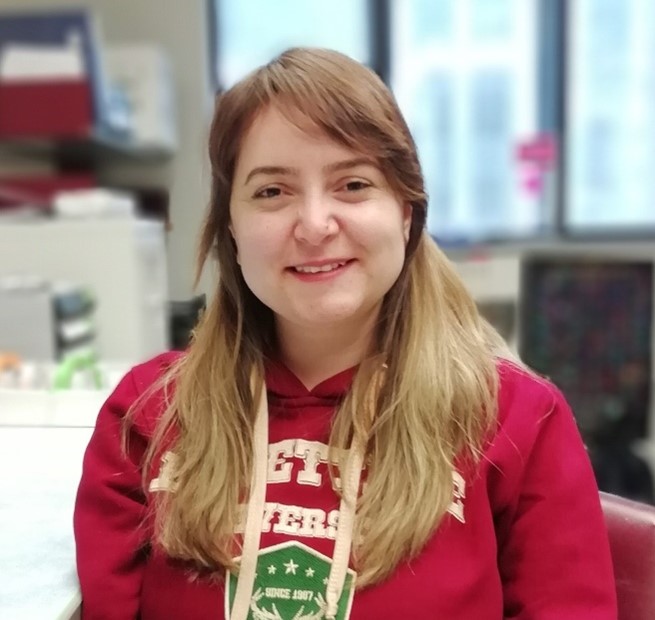
I earned my bachelor's degree in Molecular Biology and Genetics from Middle East Technical University in Turkey. My passion for science led me to pursue a master’s degree in Microbiology and Biochemistry at Georg-August University in Germany, followed by a PhD in Biochemistry at Hacettepe University in Turkey. After completing my PhD, I joined the Thinakaran Lab at USF as a postdoctoral scholar, focusing on Alzheimer's disease.
Learn more about Dr. Yuksel
Can you tell us about your area of expertise and the department you are contributing to at USF?
I am a postdoctoral scholar with a focus on biochemistry and neuroscience, currently working in Dr. Thinakaran's lab within the Molecular Medicine Department at USF. Our lab is located at Byrd Alzheimer's Center and Research Institute, where we study the genetic factors of Alzheimer’s disease.
What inspired you to pursue this career path, and what keeps you passionate about it?
I have been fascinated by scientific research and discoveries since childhood. When I decided to pursue an academic career in science, I aimed to focus on a field where I could make a direct impact on human health. This ambition led me to specialize in neuroscience and Alzheimer’s disease research.
What fuels my passion for this field is the potential to create a real impact on the lives of millions affected by Alzheimer's disease. The complexity of the disease poses significant challenges, but it also drives a continuous quest for discovery and innovation. Every small breakthrough, whether it's understanding a new molecular pathway or identifying a potential therapeutic target, brings us one step closer to effective treatments. The collaborative nature of the scientific community and the hope that our collective efforts will one day lead to a cure continually motivate and inspire me in my work.
Looking back, what do you consider your biggest success or proudest moment in your research career so far?
The proudest moments in my research career are the times when I share my scientific knowledge and findings with the scientific and public communities. These moments validate the countless hours spent in the lab and demonstrate the value of my contributions to the scientific community.
How do you envision your research contributing to society or your field in the long term?
In the long term, my goal is to uncover key molecular mechanisms and pathways that drive the progression of Alzheimer’s. By enhancing our understanding of these underlying processes, my research can identify new therapeutic targets and pave the way for the development of more effective treatments. This would not only improve the quality of life for patients but also reduce the emotional and financial burden on families and healthcare systems.
What has been the most rewarding aspect of your postdoctoral experience at USF?
The combination of conducting impactful research at Byrd Alzheimer's Center and Research Institute, collaborating with esteemed colleagues throughout USF, and mentoring the next generation of scientists has made my postdoctoral experience at USF exceptionally rewarding.
What advice would you give to undergraduate or graduate students who aspire to follow a similar career path?
My advice to undergraduate and graduate students who aspire to a career in scientific research, particularly in the field of neuroscience and Alzheimer’s disease, is multifaceted:
Cultivate your curiosity and passion, focus on gaining a solid understanding of fundamental concepts in biology, chemistry, and neuroscience, get involved in research projects as early as possible, embrace collaboration, develop technical skills, and always keep your lab notes and experiments organized for future reference.
How do you maintain a healthy work-life balance while managing the demands of your postdoctoral research?
Maintaining a healthy work-life balance as a postdoctoral researcher has been quite challenging for me. The demanding nature of scientific research, particularly in a field as intricate as Alzheimer's disease, often requires long hours and intense focus, which can blur the boundaries between work and personal life. Despite these challenges, I try to set boundaries by designating specific times for work and personal activities. I also make it a point to spend quality time with family and friends, even if it's not as often as I would like.
When you're not immersed in your research, how do you like to unwind?
I like watching TV shows and movies as an easy way to escape and enjoy some downtime. Game nights with friends, spending time outdoors, shopping, and engaging in various outdoor activities are other ways to clear my mind and stay active.
What is your favorite place to hang out in the Tampa Bay area, and why is it special to you?
I like Lettuce Lake Park because of its tranquil and relaxing atmosphere.
Are you seeking any collaborations or opportunities currently? If so, how can people reach you?
Yes, I am always open to collaborations and new opportunities. If you are interested in exploring potential collaborations or have opportunities that align with my research interests, please feel free to reach out to me. You can contact me via email at yukselm@usf.edu or connect with me through professional networking platforms such as LinkedIn. I am always eager to discuss new ideas and contribute to innovative projects in the field.
What's your go-to music or podcast genre when diving into research? Does it change depending on the complexity of the work?
When diving into research, I often listen to classical music. While performing a routine experiment, I also enjoy tuning into political news programs.
What's your favorite 'fuel' for those long research sessions? Any specific snacks or drinks that keep you going?
Chocolate, Turkish desserts.
If you could have any superpower to assist with your research, what would it be and why?
Being like The Flash would be nice. With super speed, I could complete experiments in no time and still have plenty of time left for reading and analyzing data. It would also give me more time for my personal life.
Meet Dr. Ishani Wickramage
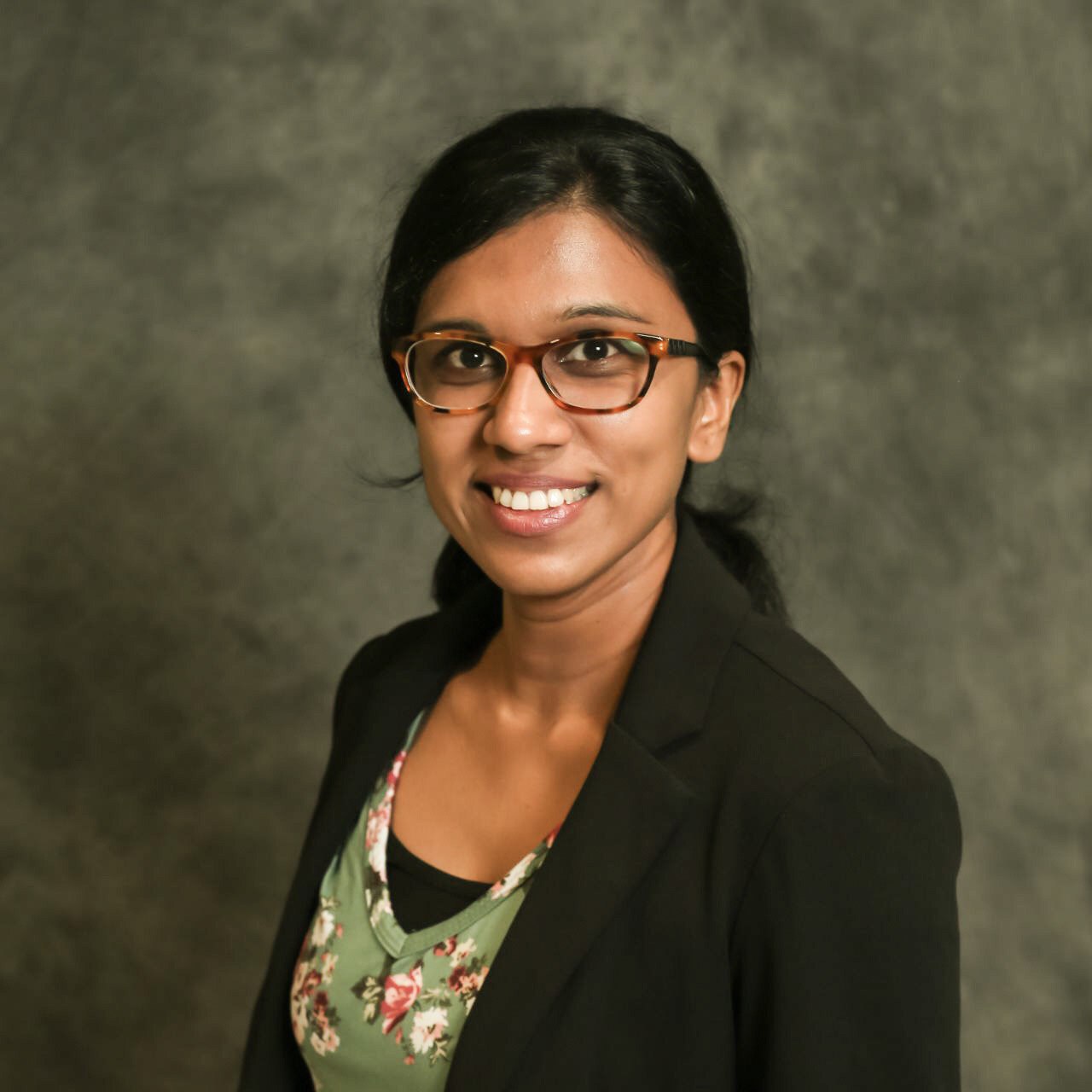
Dr. Wickramage obtained her bachelor's degree in medicine and surgery as well as a master's degree in molecular life sciences from the University of Colombo in Sri Lanka, her home country. She decided to pursue her passion for research by joining the University of South Florida as a Ph.D. student. Following the completion of her PhD in medical science from the Department of Molecular Pharmacology and Physiology, Ishani joined the Department of Internal Medicine as a postdoctoral scholar in 2023.
Learn more about Dr. Wickramage
What is your discipline and what department are you in?
Cardiac regenerative medicine
Department of Internal Medicine – Heart Institute
What drew you to this discipline?
Observing the lack of therapeutic options to treat some health conditions
What is your favorite part of being a postdoc at USF?
Exciting research, nice people, and the weather!
What is your favorite place to hang out in the Tampa Bay area?
The many, many parks in this area, especially the ones with lakes and rivers
The Great Escape: When you're not unraveling the mysteries of your field, how do you love to spend your time? Any hobbies or passions that might surprise us?
Reading and watching fiction and non-fiction. Does watching funny cat videos count?
Snack Attack: What's your favorite 'fuel' for those long research sessions? Any specific snacks or drinks that keep you going?
Coffee!
Are you seeking any collaborations or opportunities currently? If so, how can people reach you?
Always happy to discuss exciting collaborations and opportunities!
Please reach me at ishaniw@usf.edu
Meet Dr. Surendra K. Anand
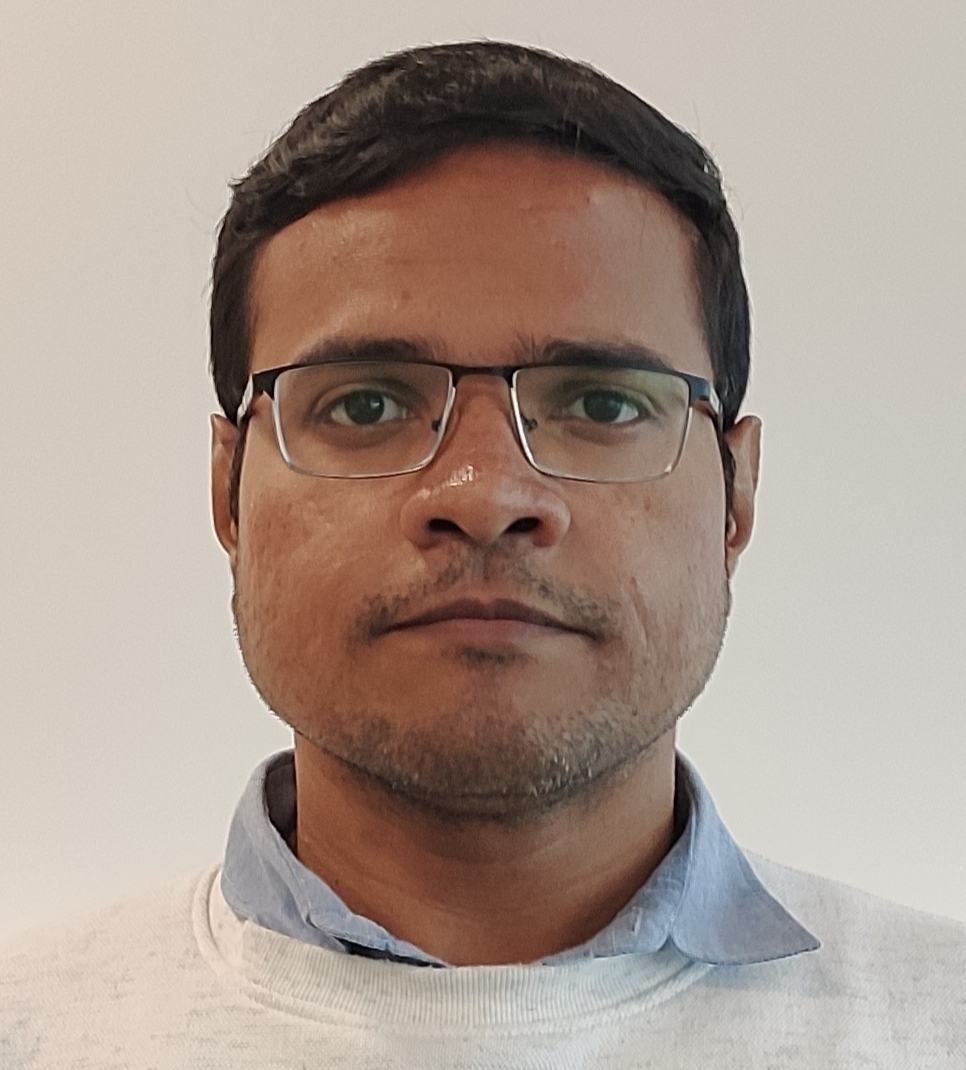
Dr. Anand is originally from India. He completed his bachelor's degree in Zoology at the University of Delhi. Before joining the USF, he got his Master of Science and Ph.D. degrees from Jawaharlal Nehru University, Delhi. He has been a postdoctoral scholar since 2022.
Learn more about Dr. Anand
What is your discipline and what department are you in?
I am currently working in Dept. of Pathology and Cell Biology in the lab of Dr. Saulius Sumanas. We study cardiovascular development in vertebrates using zebrafish as a model organism.
What drew you to this discipline?
I was drawn to developmental biology during my Masters. It was a part of my coursework. Numerous questions intrigued me at that time, like how new life is formed, how a single cell forms an entire multicellular organism, what gives rise to the diversity of cells in our body, how do we acquire our characteristic morphology and so on. Today, I try to address these questions at the molecular level.
What is your favorite part of being a postdoc at USF?
There are many, but if I had to pick one, I will say the vibrant diversity of people. You can meet and connect to students and researchers from different parts of the world, learn more about their culture, food and other fun stuff.
What is your favorite thing to do when you’re not working on unraveling the mysteries of your field?
In my free time I like spending time with my wife. We go on picnics or eating out in restaurants, I like to explore new cuisines. I love cooking, I enjoy experimenting with different ingredients. Sometimes they turn out good. I usually invite friends over to try what I experiment with in the kitchen.
What is your favourite place to hang out in the Tampa Bay area?
Tampa riverwalk is my favourite place to hang out with family and friends.
Morning Routine Magic: What's your secret ingredient for kick-starting your day? Coffee, a morning run, or something else entirely?
I start with a little bit of stretching, followed by some routine exercises such as pushups, crunches etc.
Travel Dreams: If your research could take you anywhere in the world, where would you love to go, and why?
I would love to travel to Switzerland. I have seen reels on social media and heard a lot about how beautiful it is and would like to experience that in person.
Meet Dr. Ricardo Demoya
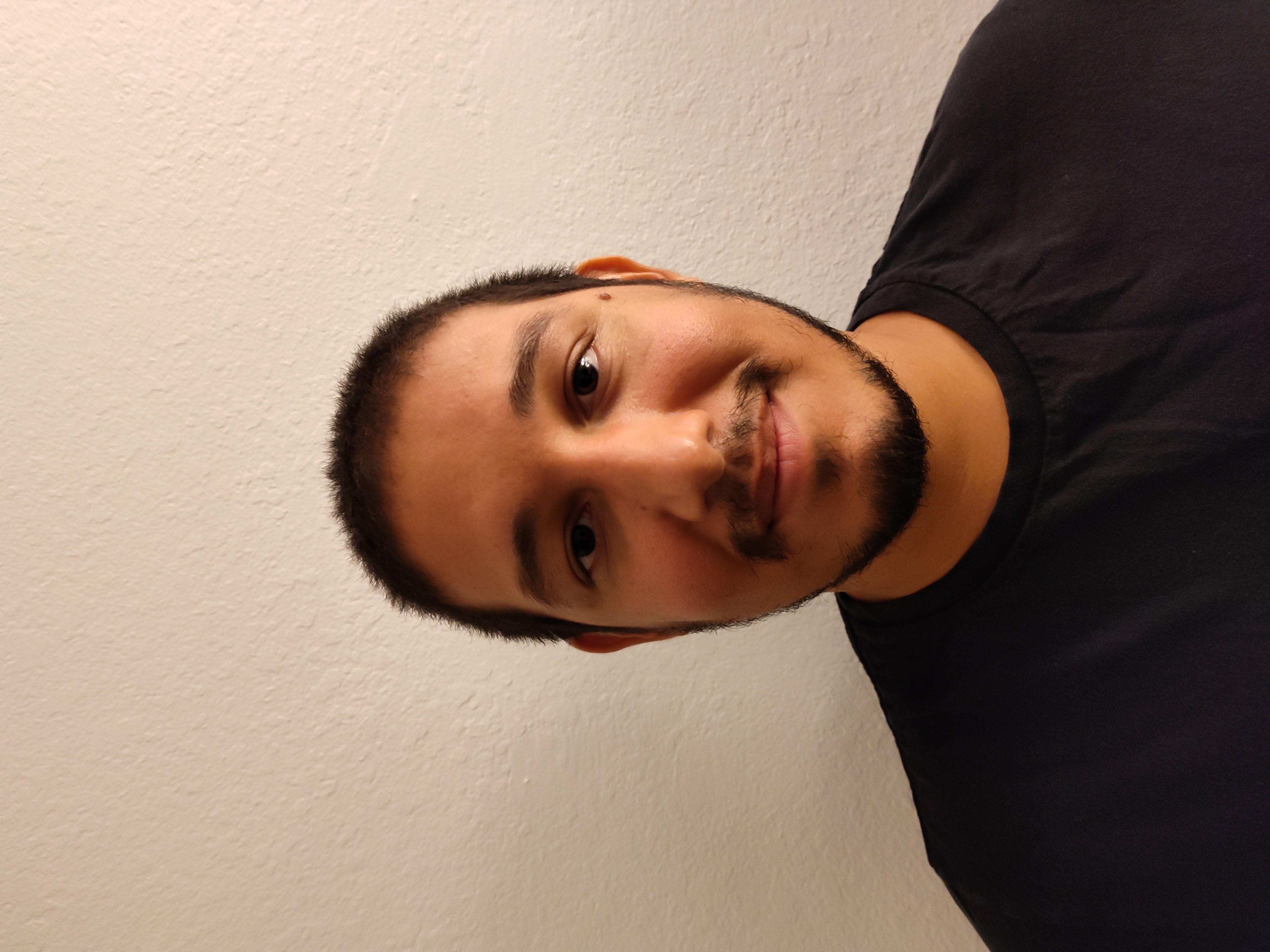
Dr. DeMoya got his bachelors degree from Barry University in North Miami and his PhD in Integrated Systems Biology from the University of Pittsburgh, PA. He has been a postdoctoral scholar at the College of Medicine at USF since 2023.
Learn more about Dr. DeMoya
What is your discipline and what department are you in?
Integrative Systems Biologist studying vascular development and regeneration in zebrafish at the Dept. Pathology and Cell Biology.
What drew you to this discipline?
I chose the ISB program at UPitt for my PhD because I wanted to know how to analyze my own data and keep working on bench work. I was drawn to in silico modeling and how it can inform animal models and experimental design. Now as a postdoc I am continuing in the same path.
What is your favorite part of being a postdoc at USF?
I am close to home and family. As they age, I wanted to be around in case they need me.
The Great Escape: What is your favorite thing to do when you’re not working on unraveling the mysteries of your field?
I like to go downhill longboard and hunt for hills to send it! Usually trips to the mountains are best.
What is your favourite place to hang out in the Tampa Bay area?
Flatwood Park, Splitsville
Fail Forward: "Can you share a funny or surprising 'fail' you've experienced in your research journey and what you learned from it?"
Was really funny but I was trying to build an app that would search for primers within a given sequence for me and I forgot about directionality when making it, so my reverse primers never worked, and I figured this out after my first primer order. I was so shocked and since that I have never forgotten nucleic acids have directionality, forward and reverse strands.
Are you seeking any collaborations or opportunities currently? If so, how can people reach you?
I am not currently looking for any collaborations but can be contacted by email. rdemoya@usf.edu
2024 Postdoctoral Symposium Winners announced
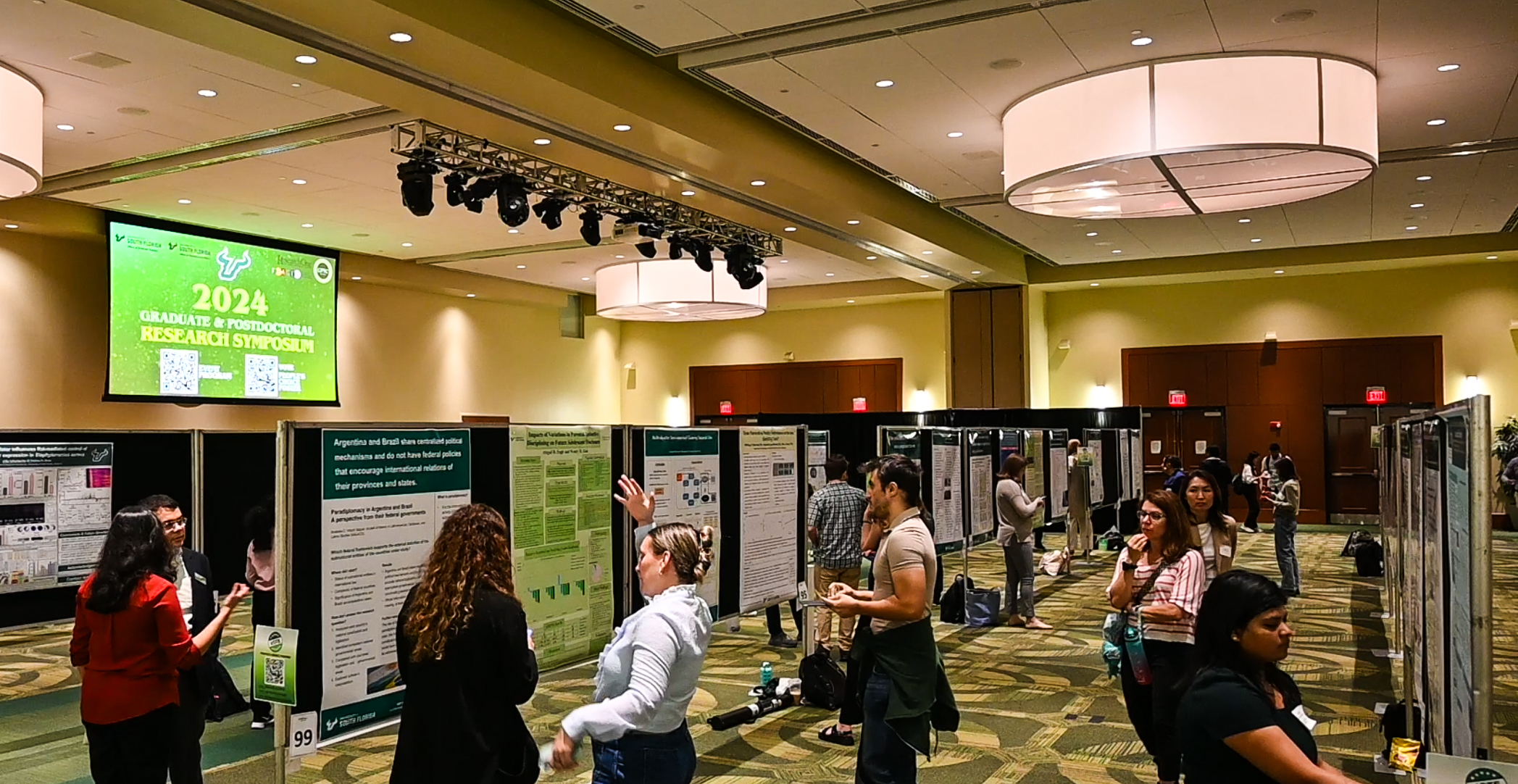
First Place | Prize: $500
Ricardo DeMoya
A search for Second Vascular Field cell markers using scRNAseq
Pathology and Cell Biology
Second Place | Prize: $300
Mehak Sapra
Characterization of rabbit alkali injury model and treatment of scarred corneal tissue
with Kuragenx
Ophthalmology
People’s Choice | Prize: $300
Melike Yuksel
The friend or foe: Ubiquitous BIN1 in Alzheimer’s disease pathology
Molecular Medicine
USF Postdoc named National Postdoc association IMPACT fellow - 1 of 6 chosen internationally

Pierre Kawak, Ph.D. has just been selected by the National Postdoctoral Association (NPA) as an NPA IMPACT Fellow (see Press Release). As a consequence, the NPA has designated USF as an NPA IMPACT Fellow Institution – one of only 18 IMPACT Fellow Institutions in the world.
He and USF were among only 6 selectees out of about 100 applicants from around the world. Just a few quotes on the program from their press release:
“IMPACT was launched in 2021 to empower postdoctoral scholars from underrepresented backgrounds to build skills, understand strengths and develop networks.”
“IMPACT Fellows also use the knowledge, tools and resources they gain from the program to implement innovative activities or initiatives at their institutions that amplify the impact of the fellowship as they contribute back to home communities.”
This is a highly select investment and vote of confidence in USF as an institution
that supports postdoctoral scholars. It provides support for Pierre to implement an
IMPACT project that will benefit success of postdoctoral researchers at USF. It is
important to recognize the impact of our researchers in workforce development at the
college level and more broadly at USF.
- via David S. Simmons, Ph.D Associate Professor
'Researcher Technology Transfer' (RTT) Initiative - (Kawak IMPACT Project)
RTT is envisioned as a knowledge exchange and skill enhancement program for early-career
researchers at USF. The core structure involves two workshop-style events each month,
targeting current interests in the wider research community. Topics could range from
"leveraging AI in manuscript writing" to "pedagogical best practices."
One of the primary objectives of RTT is to bolster retention for researchers from
all backgrounds. By inviting speakers from our local community of early-career researchers,
the initiative also aims to amplify their voices, providing a vital platform for connection,
collaboration, and community-building.
- via Pierre Kawak, USF Postdoc
Halime Gulle receives $10,000 sports Med Research Grant

This year, Halime will receive a research grant from The American College of Sports Medicine Foundation Research Grant Program. They have awarded her with $10,000 for her side project titled "Can minimal footwear use reduce the inflammatory process in individuals with plantar fasciitis?"
Felix Rodriguez Cardozo, Ph.D. at InSight Mission/NASA JPL conference

Felix recently attended a conference for the InSight Mission led by NASA’S Jet Propulsion
Laboratory (JPL).
Through his experience in late March, he was able to participate and interact with
the InSight science team. During their annual meeting, they discussed their results
and findings related to geophysical experiments on Mars.
2023 Annual Postdoctoral Research Symposium awardees
On March 22, 2023, the Office of Postdoctoral Affairs partnered with the Office of Graduate Studies to bring together researchers from all over campus to present their work at a poster competition. Postdoctoral scholars had the opportunity to present the scope and significance of their research in a concise and engaging manner without technical jargon.
The Office of Postdoctoral Affairs is proud to announce the winners of the 2023 Annual Postdoctoral Research Symposium:
Best Posters:

Pierre Kawak
Exploring Mechanisms of Enhanced Dissipation in Nanoparticle-filled Rubber Using Molecular Dynamics
College of Engineering
Department of Chemical, Biological and Materials Engineering

Claire Smith
Sleep Well by Design: Designing Modern Jobs to Support and Sustain Sleep Health
College of Behavioral and Community Sciences
School of Aging Studies
Runner-Ups:
Everette Coffman
The Attachment Adaptation Process Model: Developing Attachment Security After Experiencing Addiction in the Family
College of Behavioral and Community Sciences
Child and Family Studies
Halime Gulle
Detecting Changes in Varus Thrust Gait Using an IMU – A Pilot Study
USF Health
School of Physical Therapy and Rehabilitation